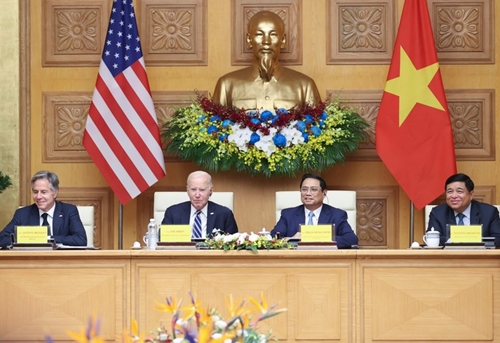So said the official while reporting on the outcomes of the high-level conference between the U.S. and Vietnam on investment and innovation held in Hanoi on September 11.
The event, attended by Vietnamese Prime Minister Pham Minh Chinh and U.S. President Joseph Robinette Biden Jr., was co-chaired by Dung and U.S. Secretary of State Antony Blinken. It saw the presence of 14 outstanding firms from both countries and formed part of the U.S. leader’s State visit to Vietnam.
Minister Dung said Vietnam’s direction for the time ahead is to selectively attract investment to develop a digital economy, green economy, circular economy, and a knowledge-based economy. Priority is given to high technology, electronics, the semi-conductor industry, innovation, renewable energy, new energy (hydrogen), financial center development, modern trade in services, infrastructure development, and research and development.
    |
 |
|
At the event (Photo: mekongasean) |
These are also the fields the U.S. is strong in, he noted, adding that the two countries are complementary to each other in these areas.
At the conference, Dung said, he asked U.S. enterprises to keep making new and expanding investments in Vietnam and assist local firms to engage in supply chains.
He suggested semiconductor manufacturers like Intel, Amkor, Marvell and Global Foundries and the U.S. Semiconductor Industry Association develop a semiconductor ecosystem, and coordinate with his ministry’s National Innovation Center to build training and R&D centers to design chips and semiconductors in Vietnam.
He called on Boeing to develop a component production ecosystem and set up a regional-level maintenance center for aviation equipment and aircraft in the country.
In addition, the minister also asked financial institutions and investment funds of the U.S. to help provide concessional credit and finance for green areas like renewable and hydrogen energy development in Vietnam, help the country develop regional and international-level financial centers, and promote bilateral trade.
Meanwhile, he recommended Vietnamese firms proactively learn experience, acquire and apply technology, improve their governance capacity, and accumulate capital in order to become able to join global value chains and cooperation activities that generate higher value, Dung reported.
Source: VNA